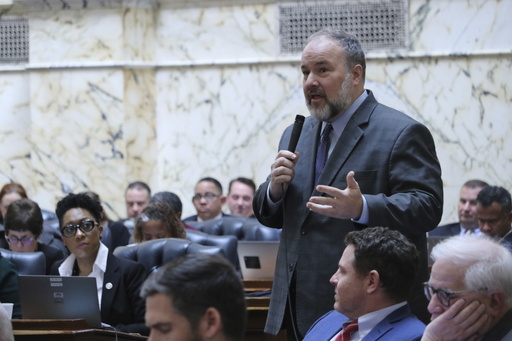ANNAPOLIS, Md. (AP) — The Maryland House approved a measure on Friday designed to improve accountability and rehabilitation in the juvenile justice system in response to an increase in some crimes like auto theft and handgun violations in parts of the state.
The House, which is controlled by Democrats, voted 126-6 for the measure, with six Democrats opposing it. The Senate is moving forward with a largely similar bill, with some differences that the two chambers will need to work out.
Part of the bill that has been getting a lot of attention relates to how the state would handle auto theft cases involving children between 10 and 12, as authorities in Baltimore have cited an increase in juvenile auto thefts.
Now, children under 13 can only be charged with violent offenses. Earlier in the session, lawmakers were considering expanding the jurisdiction of the Maryland Department of Juvenile Services to children under 13 for firearms-related offenses, auto thefts, third-degree sexual offenses and aggravated animal abuse.
While the measures moving forward in the House and Senate are largely similar, they have made some changes in how they would handle cases involving children between 10 and 12 for auto thefts.
The measure approved by the House would direct them into a diversionary program for a first offense, instead of oversight by juvenile services, in hopes of changing their behavior without putting them into the juvenile justice system.
“To be clear, we are still in the midst of this process,” said Del. Luke Clippinger, a Baltimore Democrat who chairs the House Judiciary Committee and co-sponsored the legislation. “The Senate has passed this in a different way from the House, and there are going to be further conversations that are going to be ongoing.”
For auto thefts, the Senate would use the state’s Child in Need of Supervision process, in which people file complaints about children to the juvenile services department. Sen. Will Smith, the chairman of the Senate Judiciary Proceedings Committee, said the CINS process does not allow for informal adjudication. The courts are involved, but children would not go to a detention center.
“We think this is the more elegant and proper and balanced approach, but we are going to conference and we’ll see where we land, but that’s where we are right now,” Smith, a Montgomery County Democrat, said, referring to the negotiating process the two chambers enter to bridge differences in legislation.
On firearms, Smith said the Senate bill opens up some gun offenses to delinquency jurisdiction, which is discretionary.
“Firearms are inherently dangerous, and there are some very limited circumstances in which someone has to be in supervised housing, because their home situation is not good or because the individual is a threat to themselves or our society,” Smith said.
Del. Jason Buckel, the House minority leader from western Maryland, said while the House measure isn’t perfect, it makes progress in addressing problems in the current law.
“It’s not perfect for me. It’s not perfect for a lot of others here, but I appreciate the work of those that put their time and effort into this to try to come up with something to acknowledge that there’s an issue, that there’s a problem, that we can do better, and I hope and encourage people to support the bill,” Buckel said.
Opponents of the legislation contend lawmakers already are eroding reform efforts from just two years ago that limited the crimes children under the age of 13 could be criminally charged in order to address the disproportionate numbers of young minorities mired in the system.
This website uses cookies so that we can provide you with the best user experience possible. Cookie information is stored in your browser and performs functions such as recognising you when you return to our website and helping our team to understand which sections of the website you find most interesting and useful.
